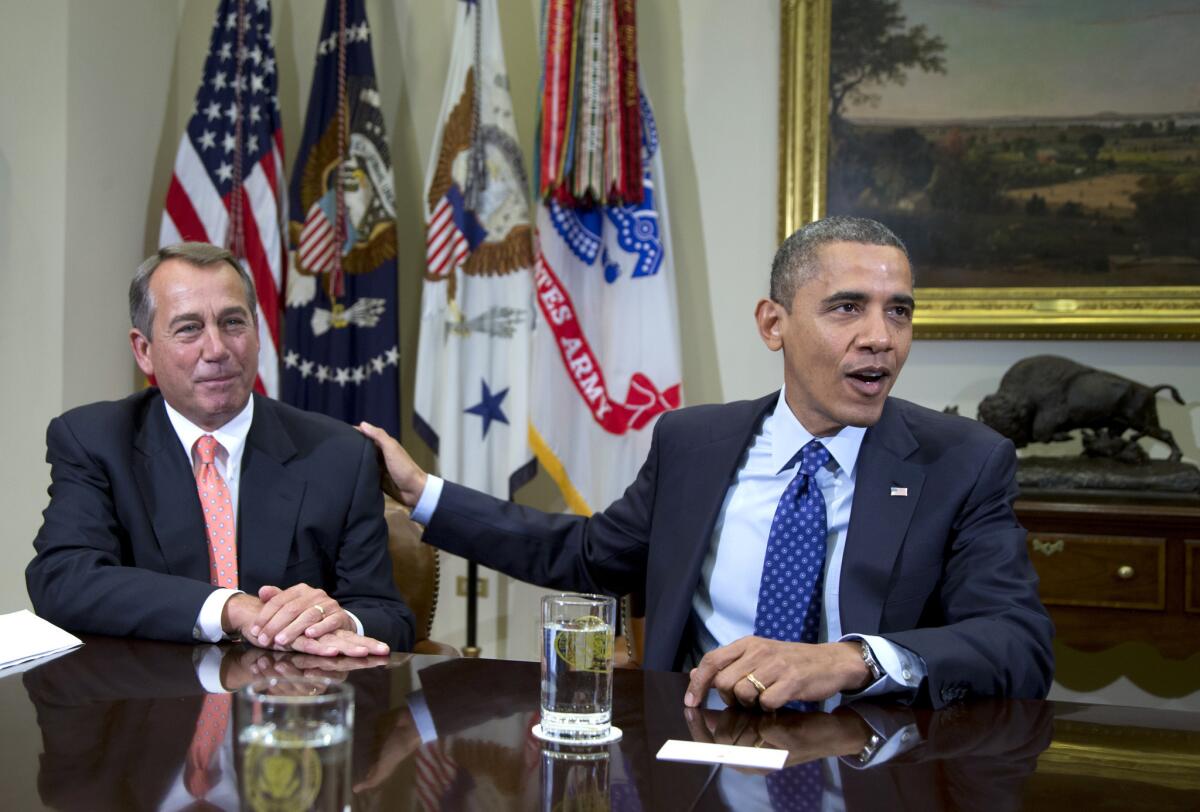Kinsley: Tuning the tax code

- Share via
Critics of the capital-gains tax are absolutely correct when they say that a tax on capital hurts the economy by reducing the incentive to save and invest. They say the same thing about the tax on investment interest, and they’re right about that too.
Unfortunately, this is true of every method of taxing capital. When you tax something, you discourage whatever it is you’re taxing. That is the tragic nature of taxation.
But if you want to spend, you’ve got to tax something, and if you’re spending a lot more than you’re bringing in, then you have a problem. You wouldn’t know this from listening to liberals in the current debate, protecting every penny of current entitlements. You wouldn’t know it from conservatives as they defend past tax cuts and argue for more. Nor would you know it from listening to conservatives and liberals as they defend the loopholes and special rules that litter the current tax code.
Recently, after an untold number of editorials endorsing austerity and calling for tax reform that closes loopholes and lowers tax rates, the New York Times ran an editorial saying, in effect: “Of course we don’t mean messing with the deduction for state and local taxes. That’s different.” Sadly, everyone has a favorite deduction that’s “different”: Charitable contributions, anyone? Home mortgages?
So, given that all taxes are disincentives, what kinds of taxes do we want? The answer is that most of the time, if we believe in free-market capitalism, we want taxes that affect behavior as little as possible. Or, to put it another way, we want a tax system that replicates the incentives of a world with no taxes.
Sometimes we do want to affect behavior. That is the explanation for “sin taxes” like the heavy taxes on cigarettes. But attempting to affect the general economy’s behavior by playing games with tax rates is a fool’s errand.
Or at least, this is what you ought to believe if you believe in free markets. So what kinds of taxes affect behavior the least? My favorite economist, Henry George (1839-1897), wanted a tax on the ownership of land, because — unlike almost any other good in our economy — you can’t make more of it and you can’t make less of it. If you own some, you’re at the mercy of the tax collector and have nowhere to hide.
A good tax — one that has minimal effect on behavior — has two qualities. First, it is as low as possible. Second, it is as consistent as possible across the alternatives.
Sure, a tax of 15% — the current, scandalously low ceiling on the tax on both capital gains and interest — would be less distortive than a tax of 35%, which was the theoretical top tax rate under President Clinton.
But the real distortion comes in a tax system that might take 15% and might take 35%, depending on the situation.
Please notice that the argument so far has said nothing about fairness. It’s all been about efficiency. So throw fairness into the equation: The capital-gains tax is paid by people who trade stocks and bonds, or buy and sell real estate or whole companies. The ordinary income tax is paid by people who work for a living.
Yes, yes, people with capital gains work too. They may even work hard. And they take risks. But it’s still a heckuva lot easier to watch your stock go up than it is to work on the assembly line, and adding in a tax differential really adds insult to injury.
Capital gains are favored by the tax system in various ways, most of which aren’t even under discussion. The biggest is that you don’t pay any taxes at all until an investment is traded or cashed in. If your stock portfolio doubles in value, you still owe no taxes unless you sell. And when you die, all those profits on unsold assets disappear for tax purposes. The meter goes back to zero for your heirs. Capital gains are also exempt from Social Security and Medicare taxes, which start at the first dollar of ordinary income.
It’s sometimes said that capital gains are “taxed twice.” First they tax your wage income, and then they tax the return on anything you manage to save out of it. In reality, much of the income of the very rich is not taxed on either occasion. Mitt Romney was embarrassed when the world discovered that he had paid taxes of only about 13% on his income in recent years. But that’s on realized income. What percentage of his total lifetime fortune will have been through the tax mill when he dies?
Anyway, what is so terrible about “double taxation”? There are two economic decisions going on: work versus sloth, and saving versus spending. True, you want to encourage work and saving, while discouraging sloth and spending. But just as true: You must tax something. So it makes sense, or so it seems to me, to tax all of these activities equally at the lowest responsible rate. Right now we are violating this principle in every possible way.
Like tuning the piano, reforming the tax code is not something you can do just once and then forget about it. You’ve got to do it and then do it again, forever. Even if we blow it this time, we’ll probably get another chance in 2036.
Michael Kinsley, a former editorial page editor of The Times, is a Bloomberg View columnist.
More to Read
A cure for the common opinion
Get thought-provoking perspectives with our weekly newsletter.
You may occasionally receive promotional content from the Los Angeles Times.









